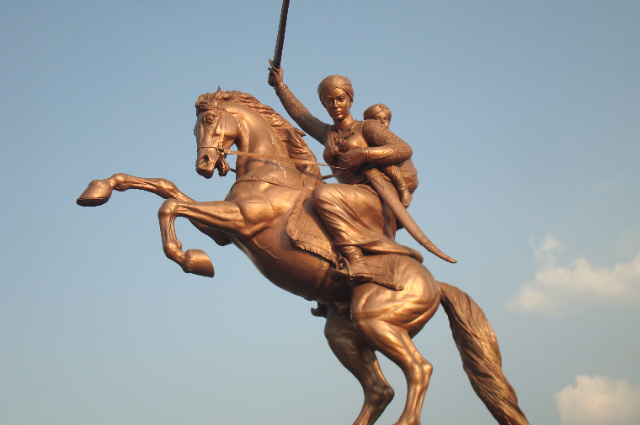खूब लड़ी मर्दानी वह तो झाँसी वाली रानी थी।
Throughout history, countless individuals have left an unforgettable legacy, and one such person who has deeply influenced my life is Rani Laxmi Bai of Jhansi. She continues to be celebrated in Indian culture through literature, folklore, and cinema, ensuring that her story of courage and resistance remains alive for future generations. Her steadfast bravery, unyielding spirit, and commitment to her people during the 1857 Revolt have not only inspired me but also shaped my understanding of resilience and leadership. Born as Manikarnika Tambe on November 19, 1828, she married Maharaja Gangadhar Rao of Jhansi, becoming the queen consort of the princely state. After her husband died in 1853, the British East India Company sought to annex Jhansi under the doctrine of lapse, sparking her resistance. Rani Laxmi Bai joined the 1857 Revolt against General Hugh Rose. Rose acknowledged her valor despite being his adversary, describing her as “personable, clever, and beautiful,” and “the most dangerous of all Indian leaders.”
Rani Laxmi Bai’s unwavering resolve to protect her kingdom and people in the face of adversity is a lesson I carry with me every day. Her courage in leading her troops into battle and her refusal to surrender, even when outnumbered, has taught me the importance of standing firm for what is right, regardless of the odds. Rani Laxmi Bai challenged the traditional gender roles of her time. General Hugh Rose noted, “Here lay the woman who was the only man among the rebels.” Her life demonstrates that gender should not limit a person’s potential, and her legacy has reinforced my belief in gender equality. Rani Laxmi Bai’s resistance against British rule in India underscores the importance of fighting against injustice. Her life stands as a compelling testament to the fact that individuals can effect significant change when they oppose tyranny, even against formidable odds. Rani Laxmi Bai’s steadfast love and commitment to her country embody the true spirit of nationalism and patriotism. Her legacy motivates people to take pride in their nations and work towards the improvement of their communities.
Rani Laxmi Bai's life and legacy continue to inspire generations with her bravery, resilience, and unwavering dedication to justice. Her fearless pursuit of freedom and her enduring commitment to her people serve as a beacon of hope and a reminder that individuals have the power to shape history. As I reflect on her extraordinary life, I am reminded that the lessons learned from historical figures like Rani Laxmi Bai can guide us in our own journeys, encouraging us to stand up for what is right, to lead with courage, and to never lose sight of our principles, even in the face of adversity.
Her story is not just one of resistance but also of profound love for her homeland. Rani Laxmi Bai’s strategic acumen in warfare, her ability to unite people from diverse backgrounds, and her relentless spirit in the face of overwhelming odds highlight her exceptional leadership qualities. She used strategic warfare techniques like the guerrilla warfare tactic which showcased her innovative approach to combat, which often caught the British forces off guard. Her legacy transcends time, reminding us that true leaders are forged in the crucible of adversity. Moreover, her life underscores the importance of education and empowerment. Despite the societal constraints of her time, Rani Laxmi Bai was well-educated and skilled in various martial arts, which played a crucial role in her leadership. Her story encourages us to value education and self-improvement as tools for empowerment and change. In honouring her memory, we find the strength to forge our own paths with the same unwavering spirit, knowing that our actions today can become the legacy of tomorrow.

